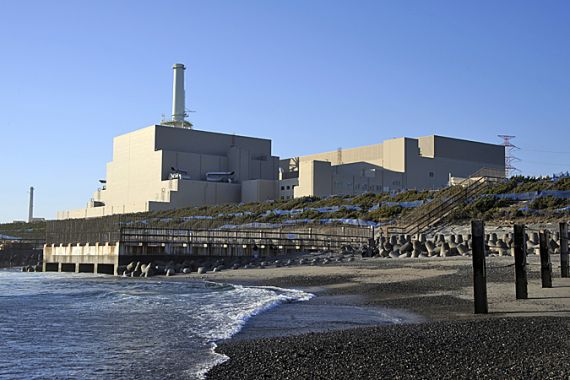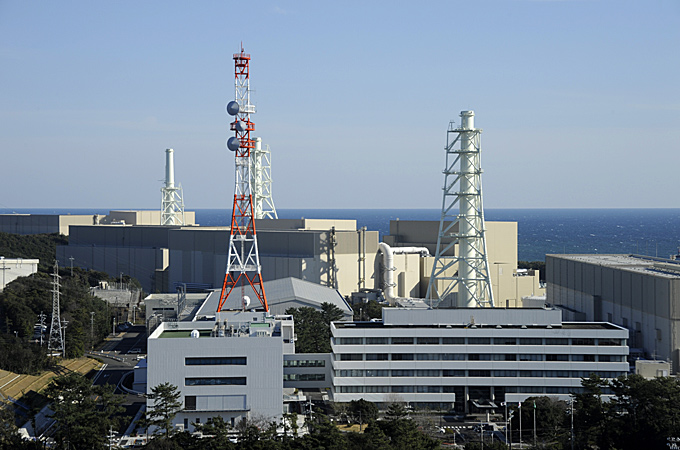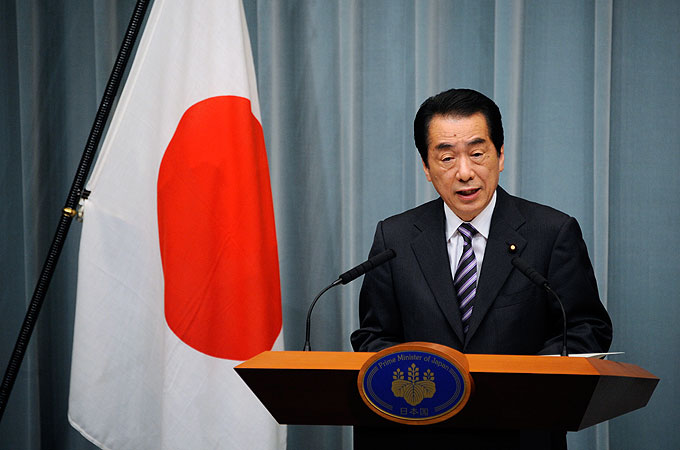Japan PM calls for nuclear plant shutdown
Naoto Kan calls for closure of Hamaoka plant, considered at high risk from a powerful earthquake in coming decades.

 |
| The Hamaoka nuclear plant is located about 200km southwest of Tokyo and sits near an active earthquake zone [EPA] |
Naoto Kan, Japan’s prime minister, has said that Chubu Electric Power Co should halt all operations at its Hamaoka nuclear plant in central Japan, due to worries a strong earthquake could cause another nuclear crisis.
The move to shutdown Hamaoka, considered as being at high risk from a powerful earthquake, follows pressure on the government to review Japan’s nuclear energy policy after a March 11 quake and tsunami crippled another plant, triggering the world’s worst nuclear accident in 25 years.
Keep reading
list of 4 itemsWorld’s coral reefs face global bleaching crisis
Why is Germany maintaining economic ties with China?
Australia’s Great Barrier Reef suffers worst bleaching on record
Kan, who has been under fire for his response to the crisis at Tokyo Electric Power Co’s (TEPCO) Fukushima Daiichi plant in northeast Japan, said the government would try to prevent the halting of the Hamaoka reactors from causing power supply problems.
Companies in eastern and northeast Japan served by TEPCO and another earthquake-affected utility have already been asked to curb electricity usage this summer when demand peaks.
The shutdown at Hamaoka raises the risk of power disruptions in the Chubu region, home to the Toyota car company and other major manufacturers.
Kan said he made the decision “out of concerns for public safety,” citing a forecast by government experts that put at 87 per cent the chance of a magnitude 8.0 quake hitting the area served by Chubu Electric within the next 30 years.
“If there were a major accident at Hamaoka nuclear plant, it would have an enormous impact on the entire Japanese society,” Kan told a televised news conference in Tokyo, Japan’s capital.
Environmental group Greenpeace issued a statement welcoming Kan’s decision but urged him to shut more plants.
“This is the first time a prime minister has directly requested a nuclear plant in Japan be closed, however, it cannot be the last,” said Junichi Sato, Greenpeace Japan executive director, in the statement.
‘Promptly consider’
The Hamaoka decision signals a likely shift in Japan’s energy policy, with the government now rethinking its target of boosting the country’s reliance on nuclear to 50 per cent of its power needs by 2030, up from 30 per cent before the quake.
 |
| Rivals in Kan’s party are keen to oust the PM, especially after a thrashing in local elections last month [EPA] |
The 3,617 megawatt Hamaoka plant accounts for about seven per cent of Japan’s combined nuclear power generating capacity.
It is located about 200km southwest of Tokyo and sits near an active earthquake zone.
Akihisa Mizuno, Chubu Electric’s president, said in a statement that the firm will “promptly consider” the request.
The Kyodo news agency, citing a Chubu source, reported that the company would comply with the government’s decision.
PM criticised
Local authorities have been concerned about safety at Hamaoka after the tsunami crippled cooling systems at TEPCO’s Fukushima Daiichi plant, where engineers are still struggling to contain the crisis.
Chubu, Japan’s third-largest utility after TEPCO and Kansai Electric Power, would be able to complete in about two years construction of a tsunami wall and other measures to protect Hamaoka from a tsunami of the same scale as the one on March 11, the trade ministry said.
Banri Kaieda, the country’s trade minister, who in March ordered immediate steps to boost nuclear safety, said in a statement that operators have taken measures to ensure cooling system can keep working even if power is knocked out by a tsunami.
The trade ministry said it would not ask other plant operators to shutdown following the approval of such steps, paving the way for the restart of other reactors under maintenance, providing they can get the greenlight from local authorities.
Kan warned that some power shortages may occur in the summer when consumption peaks, but said he believed that efforts by the public to save electricity could prove sufficient to avoid serious problems.
Kaieda said he did not think Chubu will need to conduct rolling blackouts due to the halt at the Hamaoka plant.
He said Chubu could rely on thermal and hydro power sources to fill the shortfall, and that Kansai Electric had been enlisted to support Chubu by providing it electricity.
Kan, already unpopular before the triple calamities struck, has come under criticism for his response to the disaster that has killed 14,800 people, left about 11,000 missing and led to radiation leaks at Fukushima Daiichi.
Opposition parties that have the power to block bills in the divided parliament want Kan to quit and rivals in his own party are also keen to oust the premier, especially after a thrashing in local elections last month.